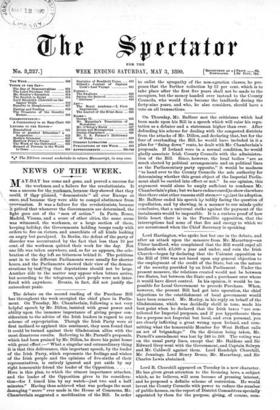Lord Hartington, who spoke last but one in the debate,
and after an attack upon the measure from Mr. Macartney—an Ulster landlord, who complained that the Bill would expel all landlords with £5,000 a year and under, and ruin the Irish Church—began by declaring that the Unionist opposition to the Bill of 1886 was not based upon any general objection to the employment of the credit of the State, but on the nature of the security provided by an Irish Parliament. Under the present measure, the relations created would not be between two States, but between the State and a purchaser over whom it would have direct control. In his opinion, it would be im- possible for Local Government to precede Purchase. When, however, the present Bill had got into operation, the chief objections to the establishment of local government would have been removed. Mr. Morley, in his reply on behalf of the Gladstonians, which was decidedly shrill in tone, made his best point when he declared that the Irish taxes "are con- tributed for Imperial purposes, and if you hypothecate them for a purpose not Imperial but local, and even personal, you are clearly inflicting a great wrong upon Ireland, and com- mitting what the honourable Member for West Belfast calls an act of brigandage." On the division being taken, Mr. Parnell's amendment was lost by 348 to 268. The voting was on the usual party lines, except that Mr. Haldane and Sir Edward Grey went with the Government, and Captain Selwyn and Mr. Caldwell against them. Lord Randolph Churchill, Mr. Jennings, Lord Henry Brace, Mr. Macartney, and Sir Charles Lewis abstained.






































